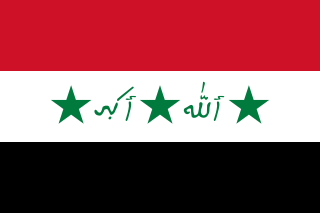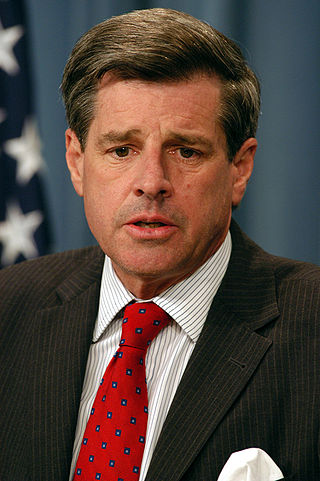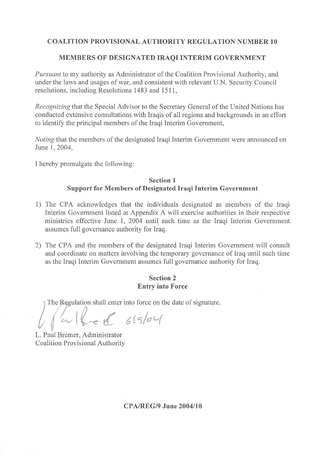
The Oil-for-Food Programme (OIP), established by the United Nations in 1995 was established to allow Iraq to sell oil on the world market in exchange for food, medicine, and other humanitarian needs for ordinary Iraqi citizens without allowing Iraq to boost its military capabilities.

The Coalition Provisional Authority was a transitional government of Iraq established following the invasion of the country on 19 March 2003 by the U.S.-led Multinational Force and the fall of Ba'athist Iraq.

Lewis Paul Bremer III is an American diplomat. He led the Coalition Provisional Authority (CPA) following the 2003 invasion of Iraq by the United States, from May 2003 until June 2004.

The occupation of Iraq was characterized by a large United States military deployment on Iraqi territory, beginning with the U.S.-led invasion of the country in March 2003 which overthrew the Ba'ath Party government of Saddam Hussein and ending with the departure of US troops from the country in 2011. Troops for the invasion came primarily from the United States, the United Kingdom and Australia, but 29 other nations also provided some troops, and there were varying levels of assistance from Japan and other countries.

Iraqi sovereignty was interrupted by the multinational forces which overthrew Saddam Hussein in the 2003 invasion of Iraq.
Investment in post-2003 Iraq refers to international efforts to rebuild the infrastructure of Iraq since the Iraq War in 2003. Along with the economic reform of Iraq, international projects have been implemented to repair and upgrade Iraqi water and sewage treatment plants, electricity production, hospitals, schools, housing, and transportation systems. Much of the work has been funded by the Iraq Relief and Reconstruction Fund, and the Coalition Provisional Authority.

The Iraqi National Intelligence Service (INIS) is an intelligence agency of the Iraqi government that was created in April 2004 on the transitional authority of the Coalition Provisional Authority, following the American invasion of Iraq a year prior.
In May 2003, following the invasion of Iraq in March of that year, the Central Bank of Iraq-Development Fund for Iraq (DFI) account was created at the U.S. Federal Reserve Bank of New York at the request of the Coalition Provisional Authority (CPA) Administrator. A part of the fund has been transferred to Baghdad and Iraq, and the DFI-Baghdad account was opened at the Central Bank of Iraq "for cash payment requirements". The fund also eventually received money from seized and "vested" Iraqi bank accounts and funds seized by coalition forces. $650 million of this amount belongs to Uday Saddam Hussein, the older son of the former Iraqi president. The DFI have been disbursed mainly for "the wheat purchase program, the currency exchange program, the electricity and oil infrastructure programs, equipment for Iraqis security forces, and for Iraqi civil service salaries and ministry budget operations".

United Nations Security Council resolution 1483, adopted on 22 May 2003, after recalling all previous resolutions on the situation between Iraq and Kuwait, the Council lifted trade sanctions against Iraq and terminated the Oil-for-Food Programme.
The Coalition Provisional Authority Program Review Board was composed of the senior personnel of the Coalition Provisional Authority, charged with the responsibility to review and make recommendations about the awarding of contracts to the administrator of the authority, Paul Bremer.
George B. Wolfe was born and raised in Columbia, South Carolina. He is a partner in the law firm of Nelson Mullins in Columbia, South Carolina. His practice is focused on representing foreign and domestic companies establishing or expanding operations in South Carolina.

United Nations Security Council resolution 1546, adopted unanimously on 8 June 2004, after reaffirming previous resolutions on Iraq, the Council endorsed the formation of the Iraqi Interim Government, welcomed the end of the occupation and determined the status of the multinational force and its relationship with the Iraqi government.

The Office of the Special Inspector General for Iraq Reconstruction (SIGIR) was created as the successor to the Coalition Provisional Authority Office of Inspector General (CPA-IG). SIGIR was an independent government agency created by the Congress to provide oversight of the use of the $52 billion U.S. reconstruction program in Iraq. Stuart W. Bowen Jr. was appointed to the position of CPA-IG on January 20, 2004 and served until its closure in October 2013. SIGIR reported directly to Congress, the Secretary of State, and the Secretary of Defense.

Philip Bloom is an American businessman who pleaded guilty on April 18, 2006 to conspiracy, bribery and money laundering in connection with a scheme to defraud the Coalition Provisional Authority – South Central Region (CPA-SC) during the occupation of Iraq. According to the Sydney Morning Herald Bloom used CPA funds to pay out over $2 million USD in bribes, in cash, real estate, designer cars, watches, and the services of prostitutes he brought to Bagdad. Bloom accepted at least $1 million in bribes and stole a further $600,000 in cash and goods from CPA funds.
The Republic of Iraq's legal system is in a period of transition in light of the U.S.-led invasion in 2003 that led to the fall of the Baath Party. Iraq does have a written constitution, as well as a civil, criminal and personal status law. In September 2008, the Iraqi Legal Database, a comprehensive database that makes all Iraqi positive law freely available to users online, was launched.
Coalition Provisional Authority Order 17 stated that Iraqi laws do not hold over contractors.
Coalition Provisional Authority Order Number 2: Dissolution of Entities signed by Coalition Provisional Authority on 23 May 2003, disbanded the Iraqi military, security, and intelligence infrastructure of President Saddam Hussein. It has since become an object of controversy, cited by some critics as the biggest American mistake made in the immediate aftermath of the fall of Saddam Hussein and as one of the main causes of the rise of the Islamic State of Iraq and the Levant (ISIL/ISIS).
The 100 Orders are "binding instructions or directives to the Iraqi people that create penal consequences or have a direct bearing on the way Iraqis are regulated, including changes to Iraqi law" created in early 2004 by Paul Bremer under the Coalition Provisional Authority in Iraq. The orders called for the de-Baathification of Iraq as well as extensive economic changes. Most of the economic changes are focused on transitioning the economy of Iraq from a centrally planned economy to a market economy, as outlined in the contract by BearingPoint:
Economic reform in Iraq describes decisions by the Coalition Provisional Authority to dramatically change the economy of Iraq in the aftermath of the 2003 U.S.-led invasion.

De-Ba'athification refers to a policy undertaken in Iraq by the Coalition Provisional Authority (CPA) and subsequent Iraqi governments to remove the Ba'ath Party's influence in the new Iraqi political system after the U.S.-led invasion in 2003. It was considered by the CPA to be Iraq's equivalent to Germany's denazification after World War II. It was first outlined in CPA Order 1 which entered into force on 16 May 2003. The order declared that all public sector employees affiliated with the Ba'ath Party were to be removed from their positions and to be banned from any future employment in the public sector.










